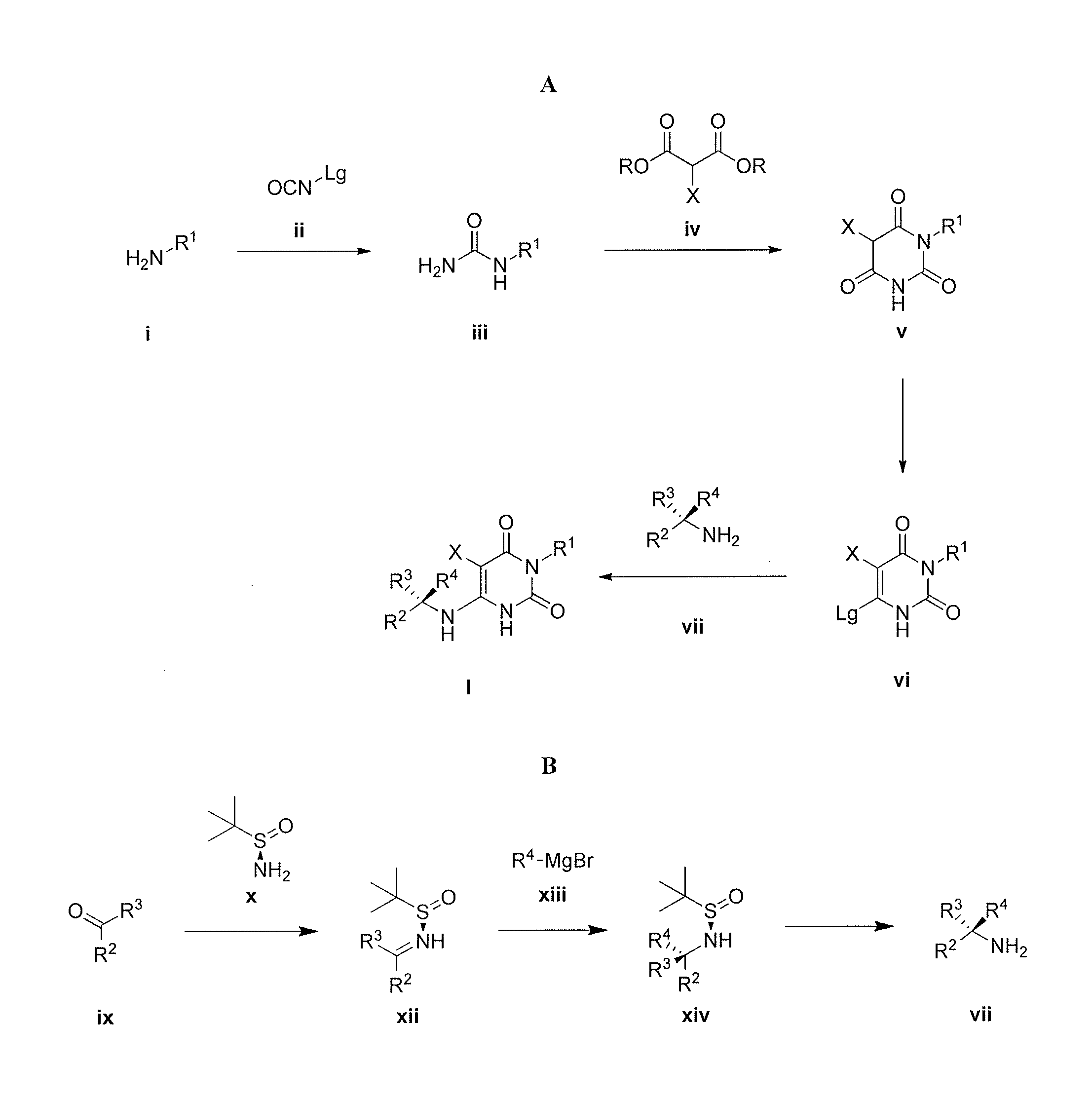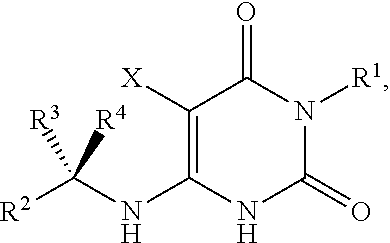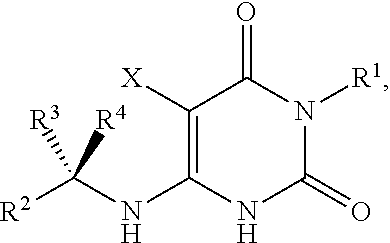Pyrimidinedione compounds
a technology of pyrimidinedione and compounds, applied in the field of pyrimidinedione compounds, can solve the problems of limiting patients' activities of daily living, affecting the quality of life of patients,
- Summary
- Abstract
- Description
- Claims
- Application Information
AI Technical Summary
Benefits of technology
Problems solved by technology
Method used
Image
Examples
example 1
Preparation of (S)-3-Isopropyl-6-((1-phenylethyl)amino) pyrimidine-2, 4(1H,3H)-dione
[0245]
Compound 1.1. Isopropylurea
[0246]To a stirred solution of isopropylamine (15.3 g, 0.258 mol, 1.0 equiv) in CH2Cl2 (200 mL) under argon at 0° C. was added dropwise trimethylsilyl isocyanate (30 g, 0.26 mol, 1.0 equiv). The resulting mixture was allowed to reach ambient temperature and stirred overnight. After cooling to 0° C., CH3OH (100 mL) was added dropwise. The resulting solution was stirred for 2 hours (h) at room temperature and then concentrated under reduced pressure. The crude residue was recrystallized from CH3OH:Et2O (1:20) to yield 15.4 g (58%) the title compound as a white solid. LC / MS: m / z (ES+) 103 (M+H)+.
[0247]
Compound 1.2. 1-Isopropyl barbituric acid
[0248]To a stirred solution of 1.1 (14.4 g, 0.14 mol, 1.00 equiv) in CH3OH (500 mL) were added dimethyl malonate (19.55 g, 0.148 mol, 1.05 equiv) and sodium methoxide (18.9 g, 0.35 mol, 2.50 equiv). The resulting mixture was stirred ...
example 2
Preparation of (S)-5-Fluoro-3-isopropyl-6-((1-phenylethyl)amino)pyrimidine-2,4(1H,3H)-dione (2)
[0253]
[0254]To a solution of 1 (80 mg, 0.293 mmol) in acetic acid (2.0 mL) was added selectfluor (104 mg, 0.293 mmol, 1.0 equiv.). The mixture was stirred at room temperature for 2 h. It was then concentrated under reduced pressure. The residue was purified by silica gel column chromatography, eluted with 0-50% EtOAc in hexanes to give 6 mg (7%) of the title compound as a white solid. LC / MS: m / z (ES+) 292 (M+H)+. 1H NMR (400 MHz, CD3OD): δ ppm 7.36-7.24 (m, 5H), 5.04-4.97 (m, 1H), 4.94-4.88 (m, 1H), 1.54 (d, J=8.0 Hz, 3H), 1.39 (m, 6H).
example 3
Preparation of (S)-5-Bromo-3-isopropyl-6-((1-phenylethyl)amino)pyrimidine-2,4(1H,3H)-dione (3)
[0255]
[0256]To a solution of 1 (55 mg, 0.201 mmol) in acetic acid (1.0 mL) was added N-bromosuccinimide (35 mg, 0.196 mmol). The mixture was stirred at room temperature for 1 hour. It was then concentrated under reduced pressure. The residue was purified by a silica gel column, eluted with 0-40% EtOAc in hexanes to give 52 mg (74%) of the title compound as a white solid. LC / MS: m / z (ES+) 352, 354 (M+H, bromine pattern)+. 1H-NMR (400 MHz, CDCl3) δ ppm 8.96 (br s, 1H), 7.43-7.28 (m, 5H), 5.28 (d, J=7.4 Hz, 1H), 5.14 (m, 1H), 4.87 (m, 1H), 1.62 (d, J=6.7 Hz, 3H), 1.45-1.39 (m, 6H).
PUM
| Property | Measurement | Unit |
|---|---|---|
| temperature | aaaaa | aaaaa |
| temperature | aaaaa | aaaaa |
| temperature | aaaaa | aaaaa |
Abstract
Description
Claims
Application Information
 Login to View More
Login to View More - R&D
- Intellectual Property
- Life Sciences
- Materials
- Tech Scout
- Unparalleled Data Quality
- Higher Quality Content
- 60% Fewer Hallucinations
Browse by: Latest US Patents, China's latest patents, Technical Efficacy Thesaurus, Application Domain, Technology Topic, Popular Technical Reports.
© 2025 PatSnap. All rights reserved.Legal|Privacy policy|Modern Slavery Act Transparency Statement|Sitemap|About US| Contact US: help@patsnap.com



